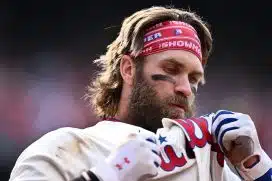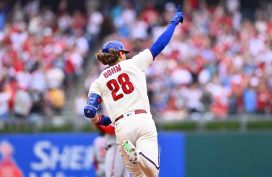By Tim Kelly, Sports Talk Philly editor
Chase Utley already had one of the more complicated Hall of Fame cases ever. It's become even more complicated in the last week.
Though he's never going to have Hall of Fame-caliber counting numbers, Utley reached a key milestone in the last week – he passed Hall of Famer Craig Biggio in WAR, according to Baseball Reference. Utley now has a 65.3 career WAR, while Biggio had a 65.1. Because Utley is still playing, that number can, as it has over the past week, still fluctuate. But, there's a very good chance Biggio will be among the Hall of Famers that Utley finishes with a higher career WAR than.
In addition to now having a slightly lower career WAR than Utley, Biggio, who was inducted into the Hall of Fame in 2015, trails Utley in other key career metrics. Utley also has better career WAR-7 and JAWS – numbers that measure a player's peak – than Biggio, and by a comfortable margin.
Related: How does Chase Utley's Hall of Fame case stack up again Robinson Cano's?
What's interesting is that Baseball Reference gives the average WAR, WAR-7 and JAWS of Hall of Fame second baseman. Utley is still about four wins short of the average WAR for a Hall of Famer, meaning he's likely to finish his career shy of that average. With that said, he has a 49.1 WAR-7, as opposed to a 44.5 average for Hall of Famers. He has a 57.2 JAWS, which is higher than the 56.9 average for Hall of Famers.
Utley's career WAR, because injuries cost a good amount of games during the back-half of his prime, will, like his counting numbers, always probably be short of the average for Hall of Famers. But Hall of Famers Ryne Sandberg, Roberto Alomar, Joe Gordon and Biggio, among others, all fall short of the 69.4 average career WAR for Hall of Famers as well. Utley is equal to or better than every single one of them in terms of WAR-7 and JAWS, meaning he had as good of a prime or better prime than them. He now tops Biggio and Gordon in in career WAR as well.
The thing is, someone like Biggio didn't have to bleed his way into the Hall of Fame, so to speak. In his first year of eligibility of 2013, he got 68.2 percent. A year later, he fell .2 percent away from gaining induction, as he received 74.8 percent of the vote. And then, in 2015, he was inducted. Biggio wasn't the type of case that had to wait until the Veteran's Committee to get inducted, he had a pretty quick ascension to being inducted.
Biggio does have some numbers that voters may value that Utley can't compete with. Because of the series of injuries Utley dealt with during his early-30s, his counting numbers (career hits, doubles, etc.) fall short of what Biggio – and most Hall of Famers – had. Biggio was a four-time Gold Glove Award winner, while Utley never won the award. Biggio made seven All-Star teams, while Utley has made six. Biggio never won an MVP, but he had two top-five finishes, while Utley never finished in the top-5.
Chase Utley on future: There's not a whole lot more years left
I would argue that an exception should be made for Utley in terms of counting numbers, because he had such a dominant peak that it's evident his counting numbers would be Hall of Fame worthy had it not been for injuries. I would also argue that using awards voting to judge a player's Hall of Fame case isn't a great strategy, because voting is subjective, and even the same voters wouldn't necessarily vote the same way in 2017 that they did in 2007. Does anyone really think that Utley, who had five seasons with a 7-WAR or higher (per Baseball Reference) wasn't one of the five best players in the National League at any point during his career? Was Brandon Phillips, who won four Gold Glove Awards between 2008 and 2013, really a better fielder than Utley, or did he just have more flashy plays that caught the eyes of voters that didn't watch either play on a night-to-night basis?
In passing Biggio in career WAR, while already having topped him in many other peak-metrics, we're reminded that had Utley not been limited to just 226 games of a possible 486 between his age-31 and 33 seasons, he would be a slam dunk for the Hall of Fame. We're also reminded that even those these seasons cost him a chance to accumulate more counting numbers, he was an all-time great second baseman during his prime, one that deserves a hard look for the Hall of Fame after his career.







